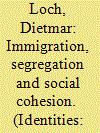| Srl | Item |
| 1 |
ID:
110789


|
|
|
|
|
| Publication |
2012.
|
| Summary/Abstract |
A new political development that emerged after the disintegration of the Soviet Union was the adoption of 'homeland stances' by the newly independent states. Through the construction of the homeland image, the states of the region claimed responsibility not only for their own citizens, but also for a diaspora community of co-ethnics. Kazakhstan became one of these states and its leadership portrayed Kazakhstan as the homeland of the Kazakh diaspora. Furthermore, Kazakhstan's leadership developed far more active homeland rhetoric and initiated an ethnic return-migration policy as early as 1992. This paper will explore the discourse of Kazakhstan's leadership on the repatriation of its co-ethnics as well as the legal and political context that it created to achieve their smooth absorption into domestic society.
|
|
|
|
|
|
|
|
|
|
|
|
|
|
|
|
| 2 |
ID:
134335


|
|
|
|
|
| Summary/Abstract |
In this article, we analyse immigrant integration against the background of German society’s social cohesion. First, we examine the integration process and policies with regard to the integration of first-generation labour migrants into the German ‘national society’ since the 1960s. Even though these ‘guest workers’ were confronted to ethnic and political exclusion owing to the so-called German integration model, they experienced socio-economic integration and, at the local level, some form of political participation. Secondly, we analyse the policies and the integration process of immigrant youth, specifically those of Turkish descent, into contemporary German society, the social cohesion of which is impeded by social exclusion and urban segregation. Our hypothesis is that – in spite of a long-standing refusal to recognise itself as an immigration country – Germany has to some extent incorporated its migrants and achieved an integration consensus, while paradoxically, national integration models in several other Western European countries are currently going through a deep crisis.
|
|
|
|
|
|
|
|
|
|
|
|
|
|
|
|
| 3 |
ID:
139808


|
|
|
|
|
| Summary/Abstract |
Since the early 2000s, Estonia and Latvia have adopted Integration Programs aimed at dealing with issues concerning their large Russian-speaking minorities. In both cases, the meaning of “integration”—originally meant to primarily indicate the Russian speakers' route to becoming part of the Estonian and Latvian societies—was redefined to include a socioeconomic dimension. This article explores the intersection between the socioeconomic and ethnic dimensions of integration policies through the analysis of the Integration Programs and related documents and process tracing of the decision making behind them. Intertwined issues of maldistribution and misrecognition are analyzed through the two competing hypotheses of response and displacement. The analysis shows the central role of mechanisms of displacement in furthering the states' (and majority elites') ethnocentric and neoliberal agendas.
|
|
|
|
|
|
|
|
|
|
|
|
|
|
|
|
| 4 |
ID:
134337


|
|
|
|
|
| Summary/Abstract |
The present article offers an account of Swedish integration policies in the post-war period. The theoretical purpose is to assess Christian Joppke’s hypothesis that recent trends of integration policy convergence have rendered the national model approach analytically useless. The analysis shows that Sweden deviates, in some important respects, from the European trend by not formulating demands that link integration achievements to immigrants’ access to fundamental rights. The conclusion is that the Swedish case does not support Joppke’s hypothesis, but rather indicates that path dependency of national models is a valid explanation to ongoing developments. It is argued that the Swedish exception should be understood as an expression of the persistent impact of a policy logic according to which integration requires that all citizens have equal and universal access to certain fundamental rights. The article builds on general comparisons with European policy developments and uses Denmark as a more specific reference point.
|
|
|
|
|
|
|
|
|
|
|
|
|
|
|
|
| 5 |
ID:
139372


|
|
|
|
|
| Summary/Abstract |
Thousands of young Europeans have joined the jihad. This essay looks at the reasons why the holy war is so popular among this cohort. While failed integration policies and widespread online media recruitment remain crucial for understanding this popularity, these explanations alone are too simplistic. Personal knowledge of other young fighters and fundamentalist imams, a lack of guidance resulting from the absence of fathers, trauma, and a kind of “outsiderism” akin to the one seen among early Nazi recruits in the 1920s are also similarities found in many of the young volunteers’ biographies.
|
|
|
|
|
|
|
|
|
|
|
|
|
|
|
|